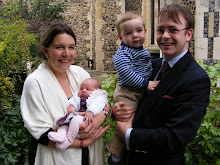Legislation:
- Acts of Parliament
- Measures (of Church Assembly or General Synod, which require Royal Assent and, since 1919 Enabling Act, have the same force as Actos of Parlt)
- Canons (these also require Royal Assent, but are subordinate in status to Measures)
- General Constitutional Principles (39 Articles, BCP and the Ordering of Bps, Priests and Deacons - the fact that the current Declaration of Assent is weaker than the old one apparently does not change the legal status of the ancient formularies in the CofE)
- Judicial Decisions (the decisions of Diocesan Chancellors do not bind other Chancellors, but if the Court of Arches, CofE's appeal court, or the Privy Council rules, its decisions bind all the Diocesan Chancellors)
- Doctrinal and liturgical statements (the only example we were given of these would be the rubrics of the BCP)
- Pre-Reformation canons (this is largely theoretical. Canon B29 makes ref to a Proviso to Canon 113 of the Code of 1603, which concerns the seal of the confessional. Canon Parrott thought it would not stand up in court if set against the Children Act.)
Quasi legislation:
- Diocesan Handbooks (some of the contents will be form Canon Law, some will be the Bishop's or Diocese's interpretation of the law)
- Regulations
- Codes of Practice
- Ad Clerum letters/Pastoral Statements
- Guidelines (central or diocesan)
From this we were told that the only canonical obedience a Bishop can demand is where he is given the authority under a piece of genuine legislation (though Canon Parrott thinks the moral obligation of the oath goes far beyond that).
Thus, commenting on the recent 'gay marriage' in London, Canon Parrott thought that, even if Richard Chartres wanted to do something, there is nothing he can do except a slap on the wrist.

No comments:
Post a Comment